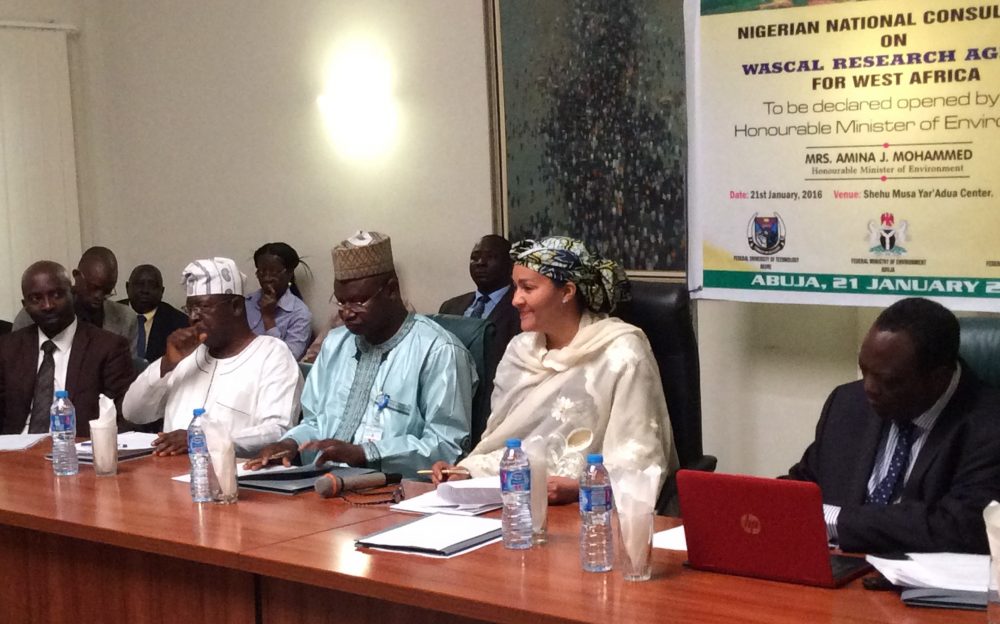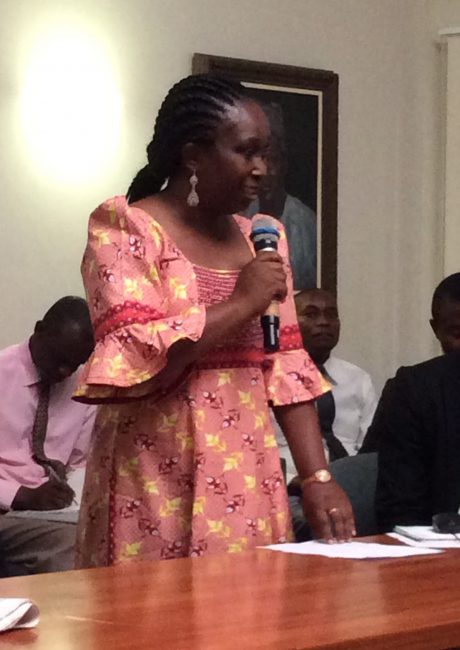The West African Science Service Centre on Climate Change and Adapted Land Use (WASCAL) has been urged to key into Nigeria’s Intended Nationally Determined Contribution (INDC) as it begins the process of preparing a Research Agenda on Climate Change for the sub-region for the period spanning 2016 to 2020.

Environment Minister, Mrs Amina J. Mohammed, who made the disclosure on Thursday (January 21, 2016) in Abuja at the opening of a daylong stakeholders’ workshop on the WASCAL Research Agenda 2016, stressed that the agenda would not only bridge the gap between educational institutions and the government, but also with the industries.
While suggesting that outcome of the consultations should be communicated to her office for onward communication to Mr President, she disclosed that, as stated in the INDC, Nigeria aims to reduce emissions by 20% below BAU (business as usual) by 2030, rising to 45% with support from the international community.
“This has provided the needed national roadmap for sustainable development at all levels and in all key stakeholder constituencies,” the minister stated, even as she lamented that Nigeria is one of the most climate vulnerable countries in the world.
Her words: “By 2050, it could cost between six percent and 30 percent of its GDP. Nigerians are already profoundly aware of the damage caused by climate change impacts. The 2012 floods that killed several people and displaced more that 2.1 million are stack realities. These impacts are threatening the livelihoods of everyday Nigerians as well as aggravate regional conflicts such as depletion of the Lake Chad in the North East and the associated collapse of economic and institutional fabric, which has proved a breeding ground for terrorism.”
According to her, the current administration has come with a Change Agenda that is committed to an economic transformation which places inclusive, green growth at its heart.
“This change includes engaging our universities and research institutes in various fields to collaborate with the government to safeguard and improve on the lives of Nigerians. Mainstreaming climate change into all facets of our lives would indeed require the outputs from credible researches undertaken in these institutions. A successful government must fully develop its institutions to embark on research and innovations that focus on our national goals.”
Mrs Mohammed lauded WASCAL, saying that within a few years of its existence it (WASCAL) has created a niche for itself “and is willing to assist the nation develop its capacity through education and research, a must in this era of changing climate.”
She added: “With dire projections made popular by the IPCC (Intergovernmental Panel on Climate Change) that fueled the UNFCCC (United Nations Framework Convention on Climate Change) to bring together the global community consistently for more than a decade, WASCAL, a collaboration of 10 member countries and Germany, is blazing the trial in enhancing the capacity of tertiary institutions and their partners in filling the much needed research gap in the sub-region.
“By encouraging young West Africans to fill the much-needed research gap that highlights the need for policy makers to collaborate with scientists, WASCAL has claimed a leadership role that should be supported by organisations like WMO (World Meteorological Organisation), UNDP (United Nations Development Programme), FAO (Food and Agricultural Organisation of the United Nations) and indeed the international community.”

Prof. Adeniyi Osuntogun, Vice-Chair of the WASCAL Governing Board, highlighting WASCAL’s future emphasis, said that a core area is to improve the livelihoods of the population in the sub-region under climate change and climate variability (CC & CV). He added that the challenge to be met before all others is to improve the accuracy of the CC & CV predictions for the WASCAL mandate area.
He said: “Key also is the development of methods that permit the application of crop models at larger spatial areas to allow hydrological and agricultural decisions on various spatial and temporal scales. WASCAL envisages the identification of vulnerable people and areas, defined as those facing scarcity and degradation and transformation of natural resources and infrastructure.
“WASCAL intends developing a set of solutions to deal with the diversity of the socio-ecological systems. Therefore, WASCAL will generate knowledge and understanding on how to accelerate the implementation of solutions and on a wider scale by disseminating information on how land use is to be managed to support and sustain ecosystem services.”
In designing WASCAL research agenda for Nigeria, Prof. Osuntogun listed specific attention to be paid to include:
- focusing on Nigeria priorities and challenges on climate change and related issues
- integrating of research with capacity building activities
- consistency with over all goal of WASCAL research agenda
- upholding of key principles of WASCAL’s research agenda
According to him, financial support is a critical and an essential factor in the formulation, promotion and implementation of a national research agenda on Climate Change, Climate Variation, Adapted Land Use and other related issues.

Prof. Jerome Omotoso, Chairman, Nigerian National Consultation/Dialogue, WASCAL Research Agenda 2016, identified goals of the consultative workshop as:
- defining the crucial climate change challenges facing Nigeria
- recommend the climate services and research needs for Nigeria to be included in the Research Agenda
- determining the potential contribution of Nigeria to the implementation of WASCAL Research programme
- identifying appropriate stakeholders to represent Nigeria at the regional consultation.
Prof. Emmanuel Oladipo of the University of Lagos, Akoka, in a keynote address submitted that WASCAL’s support to Nigeria for a science-based response to climate change challenge should be further strengthened by the establishment of a National Climate Change Commission or Agency that will be sustainably financed and strengthened to put the country in a good position to coherently address both mitigation and adaptation aspects of climate change challenge with global best approach and practices.
He added that products from the WASCAL initiative would constitute the crop of scientists in the Commission/Agency to provide much needed scientific information and data for decision making and help promote science-practice interactions for effective climate change adaptation.
“By readily absorbing many of the WASCAL-produced scientists in the Commission/Agency, the young men and women graduates will be largely assured of post qualification employment, which should in turn encourage many more to get involved – a path towards sustainability of the initiative,” he added.
Director-General/CEO, Nigeria Meteorological Agency (NiMet), Dr Anthony Anuforom, disclosed in a goodwill message that climate change is already a reality in the country, and that the conventional methods for multi-sectoral approach to combat the challenges may require redirection.
According to him, the need for actions on mitigation and adaptation built around local resources, knowledge and innovations is very imperative.
He further underlined the need for more research activities on: climate and weather extreme events; regional climate scenario for impact assessments; key climate change impacts on biodiversity in Nigeria; terrestrial carbon dynamics; and, sectoral vulnerability, impacts and adaptation to climate change in the country.
Dr Anuforom said: “Nigeria holds an immense mitigation and adaptation potential in the context of climate change that has the potential to improve rural and urban livelihoods and address issues related to ecology.”
Professor Kehinde Ogunjobi, Director, WASCAL’s Graduate Studies Programme (GSP) in West Africa Climate System at the Federal University of Technology, Akure (FUTA) in Ondo State, described WASCAL as a regional centre for capacity building in climate change across West Africa. He added that WASCAL is also designed to help tackle challenges of climate change thereby enhancing resilience of human and environmental system to climate change and variability. The WASCAL programme is being funded by the German Federal Ministry of Education and Research (BMBF).
His words: “It is a great privilege that Nigeria is the only West African country having two WASCAL programmes – one at FUTA for Ph. D and at the Federal University of Technology (FUT), Minna for M. Sc degree.”
Countries under the WASCAL programme include Nigeria, Benin Republic, Niger Republic, Togo, Cote d’Ivoire, Senegal, Mali, Burkina Faso, The Gambia and Ghana.
The dialogue was organised by FUTA, FUT Minna, and Federal Ministry of Environment, Abuja.
Director, WASCAL Masters Programme on Climate Change and Adapted Landuse (CC&ALU) at FUT Minna, Dr Appolonia Okhimamhe, in a welcome address, stated that the research-focused centre is designed to help tackle severe challenges posed by climate change and thereby enhance resilience of human and environmental systems to climate change and increased variability.
“It does so by strengthening the research infrastructure and capacity in West Africa related to climate change and by pooling the expertise of 10 West African countries and Germany,” added Dr Okhimamhe, an Associate Professor of Geography and Head of the Department of Geography.
